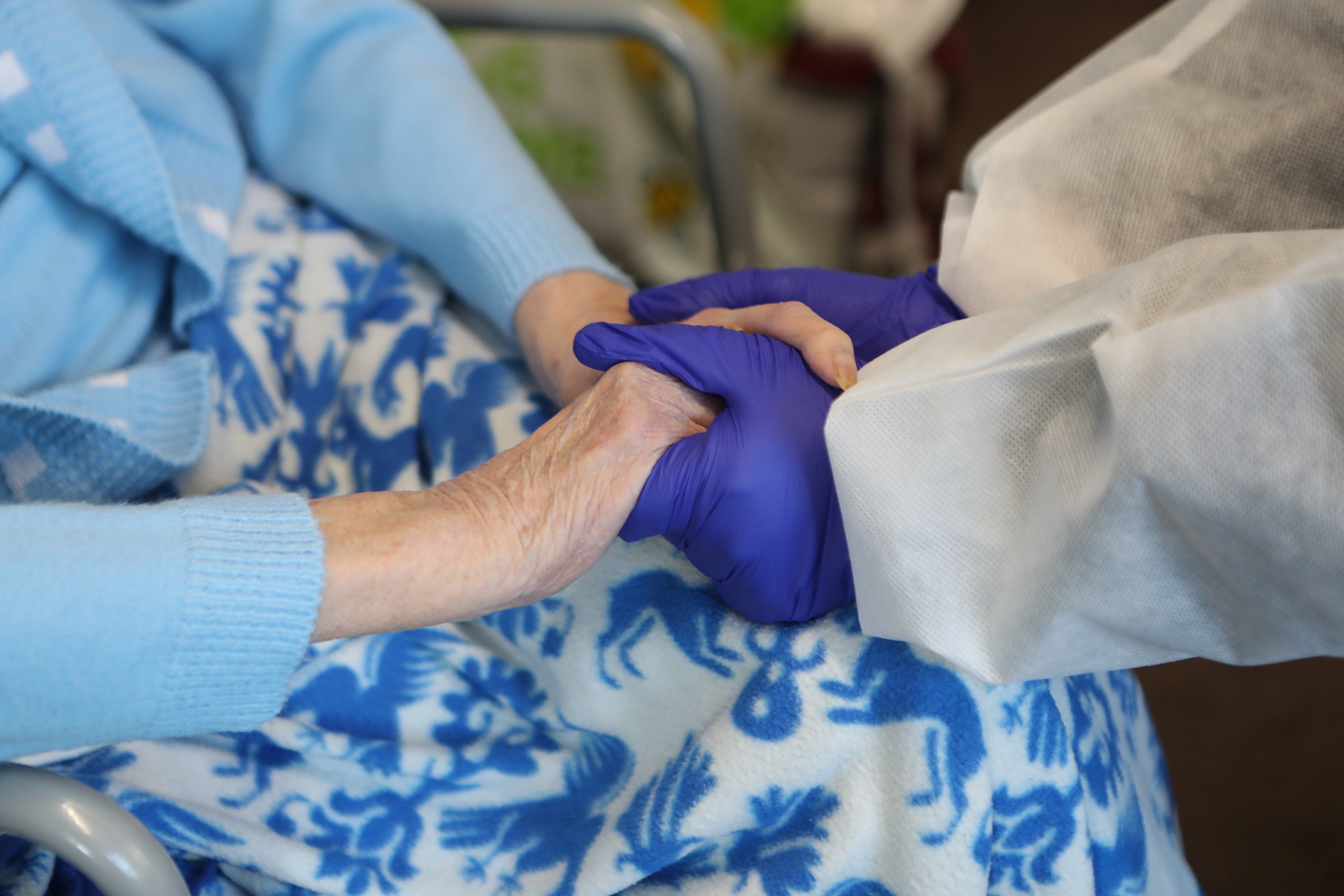I’ve just seen my mother for the first time in seven months – we both cried
Did she know who I was? Oh, yes. Did we both cry? Oh, yes. Did I take my gloves off just for a second, just for the familiar feel of her skin on mine? Oh, yes, writes Jenny Eclair


Apart from a few window waves, until last week I hadn’t seen my mother for seven months. I realise this is not a Guinness Book of Records record-breaking entry, in Covid times – but it felt like long enough.
Pre-pandemic, my mother, June, lived independently, cooking for herself from scratch every day. Convenience foods, she always said, were “cheating” – and it was only in her late 80s that she converted to pre-chopped-up butternut squash. My mother was a soup-making ninja, and after living in Asia with my army major father, back in the Sixties, she also made a mean curry.
June drove until a cataract operation a couple of years ago at the age of 89 backfired and compromised her sight. Had times been normal, she would have received laser surgery to help with this condition; but as we all know, the world went tits-up in 2020 and she remains on a waiting list.
At first, June dealt well with lockdown, and although none of her three children live locally, one of us would call her every day. She was also in constant touch with her 94-year-old sister, their relationship having been a constant source of camaraderie for so many decades. The two of them, recognisably siblings, were joined at the hip and would see each other daily – until coronavirus forced them apart.
I’m not entirely sure when my mother’s mind began to unravel. Occasionally, she would mention leaving things on the stove and not be entirely sure what the time was; but she covered herself well, and we did the same for her. “She’s 91”... “She was tired and couldn’t see her watch properly.”
Read more:
- A message to the Brits forced to return home from Spain: This is the Brexit you voted for
- If Seaspiracy persuades you to stop eating fish in order to save the environment, you are completely missing the point
- I think we can all agree the race report was a great success – except for these very minor points
- Is Britain racist? This binary question is unhelpful and obstructs real progress
When lockdown lifted, my sister and I visited, bought her a watch with a bigger face, and put markers on her hob in bright nail varnish so that she could position the dials more easily (handy hint: do not let your ageing relative buy a sleek black halogen hob complete with oh-so-subtle all-black dials).
At that stage, we were more concerned about her mobility than her mental state. As a polio victim, my mother is no stranger to the devastation of viruses – and having worn a caliper since the 1950s, her affected right leg had recently become much weaker.
We persuaded her that a wheelchair would be a good idea, found a natty second-hand one in a local shop, and the three of us had a blissful walk – my sister and I pushing our mother in the August sunshine and eating salt-and-pepper squid outdoors. She was on good form – furious about the wheelchair, but thrilled with the ride.
Two weeks later, we got one of those dreaded calls on the eve of going to Wiltshire to visit an old army friend. June, as we’d always feared she might, had “had a fall”. Having refused to be taken to hospital by the paramedics, she was now recovering at home, being cared for by her sister (who is, incidentally, registered blind). “She’s a bit bruised and rather confused” was the verdict from my aunt.
We immediately drove up – my sister, my daughter and I – to find that June was indeed bruised and very confused. Over the next couple of days, as the confusion came and went, we thought she might have had a stroke, and my mother agreed – but “Just a tiny one,” she insisted.
Except that she hadn’t – my mother had dementia, and it rapidly became glaringly obvious that she could no longer be left alone for a minute.
A couple of days later, with my brother now also in situ, we delivered June to the nursing home which had looked after my father for three years before he died.
She has been there ever since, meticulously looked after by a wonderful staff and a matron who has managed to keep the place corona-free for over a year.
Indoor visits were strictly off limits until last week, when I was allowed – after a Covid lateral-flow test – to see my mother and hold her hands.
It’s difficult to describe this meeting. In some respects, there was something of the prison visit about it – the form-filling, the regulation mask, apron and gloves that had to be worn, and the recently vacated single bedroom on the ground floor, with its bleakly empty shelves, where we were allowed some privacy for our allotted 30 minutes.
Did she know who I was? Oh, yes. Did we both cry? Oh, yes. Did I take my gloves off just for a second, just for the familiar feel of her skin on mine? Oh, yes.
She knows there is something wrong with her brain. “I think I might be in the funny farm,” she said – but she recognised all her grandchildren who had sent video messages, and ate a great deal of chocolate whilst unwrapping very late Christmas presents (hmm, no wonder she’s confused).
When I asked if she was happy to see me, she looked straight at me and said, “You have no idea,” and then we both cried some more.
Join our commenting forum
Join thought-provoking conversations, follow other Independent readers and see their replies
Comments